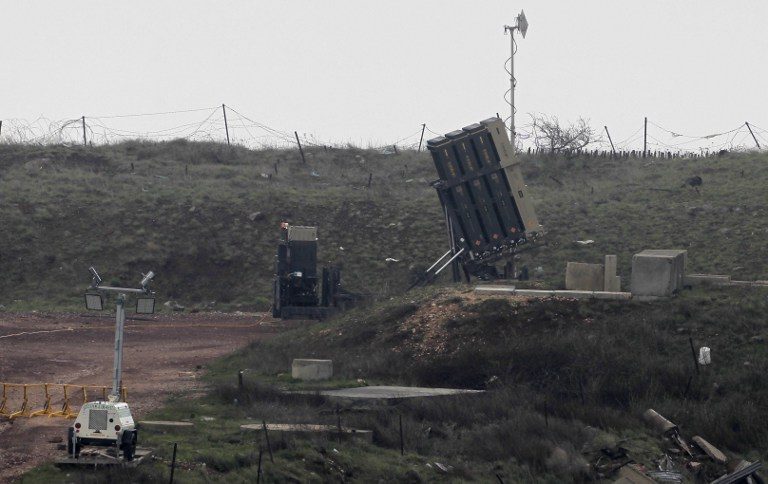SUMMARY
This is AI generated summarization, which may have errors. For context, always refer to the full article.

JERUSALEM (3rd UPDATE) – Israeli Defense Minister Avigdor Lieberman on Sunday, March 19, threatened to destroy Syrian air defense systems after they fired ground-to-air missiles at Israeli warplanes carrying out strikes.
“The next time the Syrians use their air defense systems against our planes we will destroy them without the slightest hesitation,” Lieberman said on Israeli public radio.
Israeli warplanes hit several targets in Syria on Friday, March 17, with Prime Minister Benjamin Netanyahu saying the strikes targeted weapons bound for Lebanon’s Shiite Hezbollah movement.
Syria’s military said it had downed one of the Israeli planes and hit another as they were carrying out the pre-dawn strikes near the famed desert city of Palmyra that it recaptured from jihadists this month.
The Israeli military denied that any planes had been hit. The Syrian government has made similar claims in the past.
An Israeli army statement said “several anti-aircraft missiles” were fired following the raid but that none hit their targets.
One missile was intercepted by Israel’s Arrow air defense system, Israeli media reported.
It was the most serious incident between the two countries since the Syrian civil war began 6 years ago.
In April 2016, Netanyahu admitted for the first time that Israel had attacked dozens of convoys transporting weapons in Syria destined for Hezbollah, which fought a 2006 war with Israel and is now battling alongside the Damascus regime.
“Each time we discover arms transfers from Syria to Lebanon we will act to stop them. On this there will be no compromise,” Lieberman said Sunday.
“The Syrians must understand that they are held responsible for these arms transfers to Hezbollah and that if they continue to allow them then we will do what we have to do.”
Lieberman said he did not wish “to interfere in the Syrian civil war or provoke a confrontation with the Russians” but that Israel’s security would remain his top priority.
‘Red lines’
Russia and Israel’s arch-foe Iran has supported Syrian President Bashar al-Assad’s regime in the war. Israel opposes Assad, but has sought to avoid being dragged into the conflict.
Israel does not usually confirm or deny individual raids, but it was led to do so this time by the circumstances of the incident, including the firing of the Arrow, Intelligence Minister Yisrael Katz told Agence France-Presse.
He said he believed Assad responded more strongly this time because he feels increasingly confident.
Assad’s position has been strengthened in recent months with his forces reclaiming the whole of Syria’s second city Aleppo, as well as enjoying continuing Russian support.
“He is trying to change the rules. We will not agree to change the rules,” Katz said.
He reiterated what Israel calls its “red lines,” including not allowing advanced weapons to be supplied to Hezbollah and preventing the Golan Heights from being used as a front against it.
Netanyahu has held a series of meetings with Russian President Vladimir Putin in recent months to establish a mechanism to avoid accidental clashes between their forces in Syria.
A “hotline” has been set up between the two countries, but Katz said Russia is not notified in advance of an Israeli strike.
“No one knows before what we are doing,” he said.
“We are a sovereign country that acts to protect our security interests.”
He declined to comment in detail on how the “hotline” with Russia worked, but expressed confidence the two countries could continue to coordinate despite their differing interests.
Israel seized most of the Golan Heights from Syria in the 1967 Six-Day War and annexed it in 1981, in a move never recognized by the international community.
Israel and Syria are still technically at war, though the border had remained largely quiet for decades until 2011 when the Syrian conflict began. – Rappler.com
Add a comment
How does this make you feel?
There are no comments yet. Add your comment to start the conversation.